It’s 3 a.m. You’ve been on your feet for 12 hours. Your eyes are heavy. The IV pump beeps. You reach for the wrong vial. The label blurs. You give the wrong dose. It’s not laziness. It’s not carelessness. It’s fatigue.
Why Night Shifts Are a Recipe for Medication Errors
Your body isn’t designed to be awake at night. Circadian rhythm disruption doesn’t just make you tired-it rewires your brain. A 2023 review of 38 studies found that 82% of medication errors and near misses during night shifts were linked to fatigue. That’s not a coincidence. It’s biology.
When you’re sleep-deprived, your attention span shrinks. Your reaction time slows. You forget simple steps: checking the patient’s name, verifying the dose, confirming the route. The American Society of Anesthesiologists found that after one full night without sleep, doctors showed cognitive declines similar to people with narcolepsy. Their vigilance dropped by 23%. Memory fell by 18%. That’s not a minor slip. That’s a safety crisis.
Nurses are especially vulnerable. They handle more medications than anyone else on the unit. A 2022 study of over 12,000 providers showed medical errors increased by 12.1% during night or rotating shifts. Nurses working 12-hour shifts had a 15% higher error rate than those on shorter shifts. And it’s not just about the hours-it’s the repeated nights. Working three or more nights in a row? That’s when your brain starts to shut down in slow motion.
The Hidden Culprits: Medications That Make Fatigue Worse
Here’s something no one talks about enough: some of the medications you take to cope with night shifts might be making things worse.
Over-the-counter sleep aids like diphenhydramine (Benadryl) cause drowsiness in 50-60% of users. Even if you take it at night, the next morning you’re still groggy. That lingering sedation can last hours. Zolpidem (Ambien), commonly prescribed for insomnia, leaves 15-20% of users impaired the next day-exactly when they’re supposed to be alert at work.
Benzodiazepines like diazepam cause residual sedation in 30% of people. Narcotic pain meds like oxycodone? Sedation in 25%. Even antidepressants like trazodone, often used off-label for sleep, make 40% of users feel drowsy.
The National Institute for Occupational Safety and Health (NIOSH) says if you’re feeling overly sleepy at work, check your meds. Switching from diphenhydramine to loratadine (Claritin) can cut your drowsiness risk by over half. It’s not about willpower. It’s about chemistry.
What Actually Works to Prevent Mistakes
There’s no magic bullet, but some strategies have real data behind them.
Strategic napping helps-but only if done right. A 2023 analysis of 12 clinical trials showed that naps under 20-40 minutes boosted alertness by 12-15%. But naps longer than 90 minutes? They only improved performance by 8%. Worse, waking from deep sleep causes sleep inertia-a foggy, disoriented state that lasts up to 30 minutes. During that time, your cognitive performance drops by 22%. So if you nap for an hour and then go give insulin, you’re risking more than helping.
What works better? Napping before your shift. Studies in emergency departments and ICUs found pre-shift naps reduced errors by 12-15%. It’s not about catching up. It’s about banking sleep.
Alarms and checklists are underrated. A Johns Hopkins study found clinical reminders and automated alerts cut medication errors by 18%. That’s huge. If your hospital uses barcode scanning or double-check protocols, use them-even if you’re tired. Your brain isn’t reliable. The system has to be.
Caffeine can help, but timing matters. A cup of coffee right before your most dangerous tasks-like preparing high-risk meds-can buy you 90 minutes of sharper focus. But don’t rely on it all night. Too much caffeine after midnight disrupts your next day’s sleep, creating a vicious cycle.
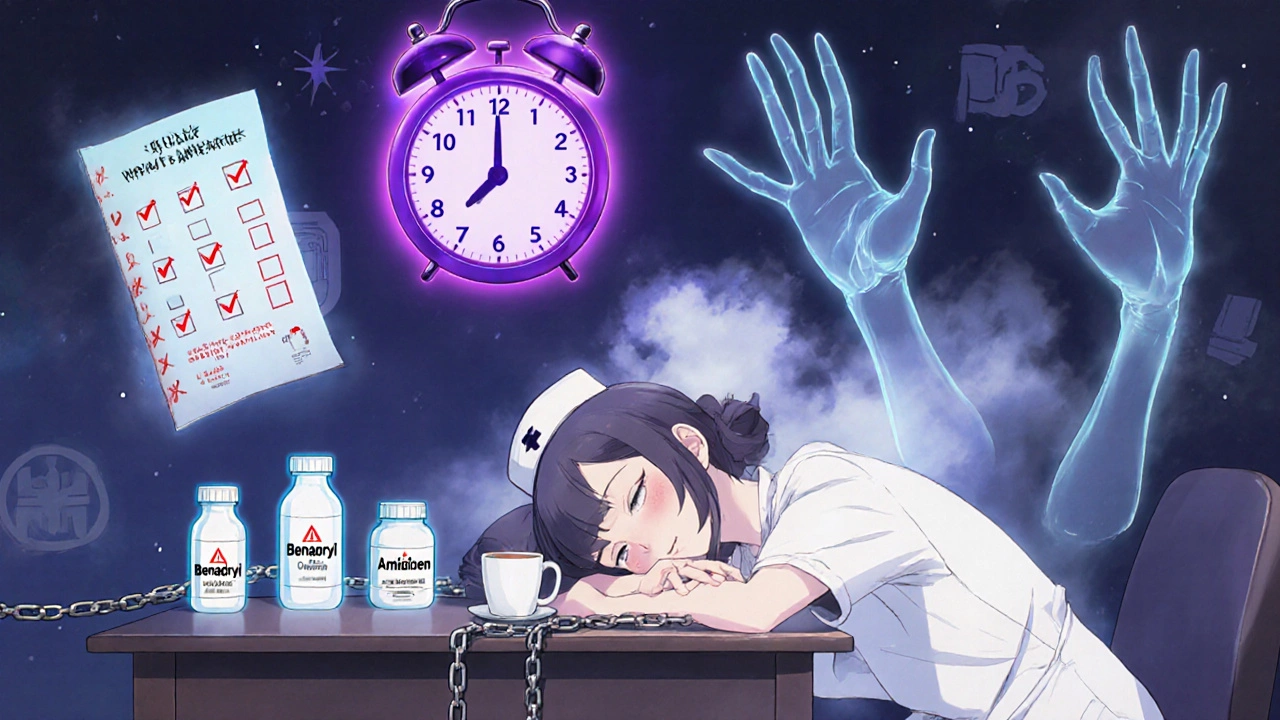
The Real Cost of a Single Mistake
Medication errors aren’t just about “oops.” They cost the U.S. healthcare system an estimated $20 billion a year. And that’s just the direct cost. Patients suffer. Some die.
Surgeons who slept less than six hours had patients with 2.7 times more complications. When their shifts went over 12 hours, complication rates jumped nearly 50%. That’s not an outlier. That’s a pattern confirmed across 22 surgical departments.
It’s not just physical harm. Fatigue erodes communication. A 2018 study found that tired clinicians had a 33% decline in effective communication with patients and coworkers. You might give the right drug-but if you don’t explain it clearly, the patient won’t know how to take it. That’s still an error.
What You Can Do Today
You can’t always control your schedule. But you can control your habits.
- Check your meds. If you’re taking anything that causes drowsiness, talk to your doctor. Swap sedating antihistamines for non-drowsy versions.
- Plan your sleep. Before a night shift, try to get 4-6 hours of sleep in the afternoon. Even if it’s not perfect, it’s better than nothing.
- Nap smart. If you can, take a 20-minute nap before your most critical tasks. Set an alarm. Don’t sleep longer.
- Use tech. Never skip barcode scans or double-checks. Let the system protect you when your brain is tired.
- Speak up. If you’re too tired to think clearly, say so. Ask for help. Hand off high-risk tasks. Your patient’s life depends on it.
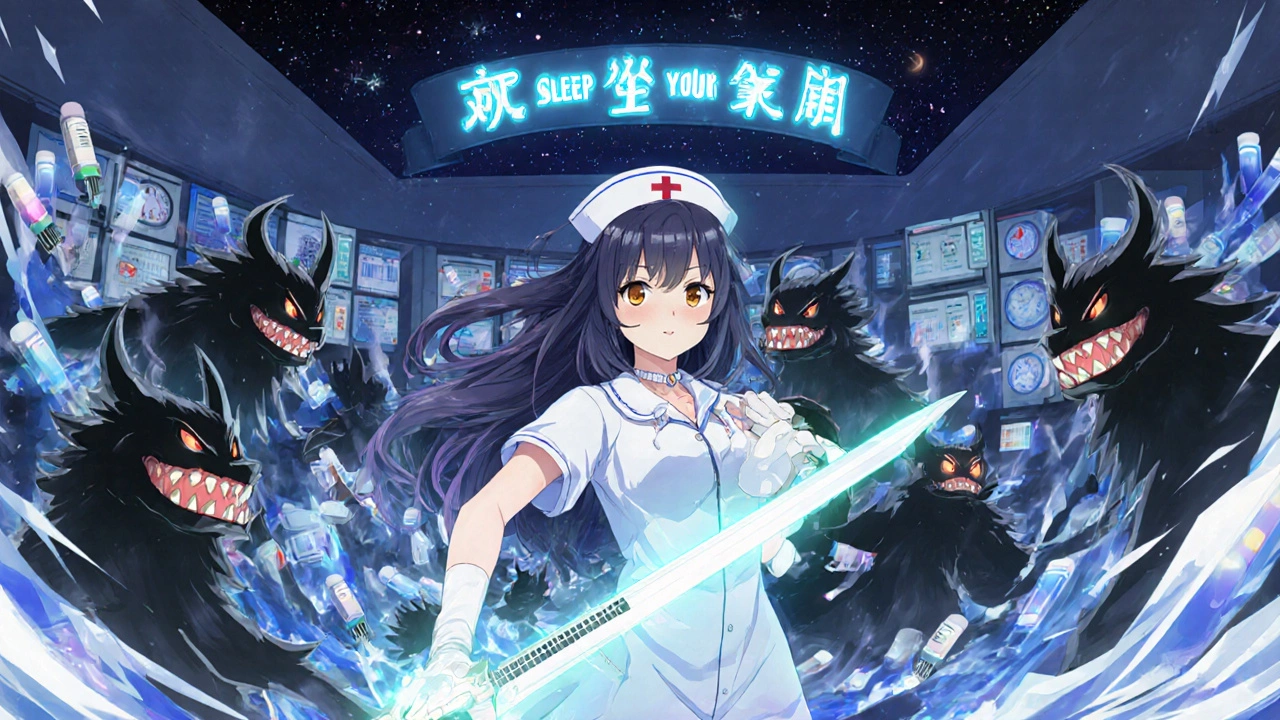
Why System Change Is Still Needed
Individual efforts matter-but they’re not enough. The 2003 ACGME rules limited resident hours, but many doctors still can’t sleep during the day. They’re stressed. They’re overloaded. They’re on call too often.
Research shows that even after a full night of sleep loss, it takes three days to fully recover cognitive function. Yet many providers are back on shift after just one day off. That’s not sustainable. That’s dangerous.
Health systems need better scheduling. They need mandatory rest periods. They need access to nap rooms. They need to stop treating fatigue like a personal failing and start treating it like the systemic risk it is.
Until then, you’re on the front line. You’re the one holding the syringe. You’re the one reading the label in the dim light. Don’t let tiredness win. Use every tool you have. Protect yourself. Protect your patients.
Can caffeine replace sleep during night shifts?
No. Caffeine can temporarily boost alertness, but it doesn’t restore cognitive function or memory. It masks fatigue without fixing it. Relying on caffeine long-term can disrupt your sleep cycle, making you more tired over time. Use it as a short-term tool-like a 100mg dose before a high-risk task-not as your main strategy.
Are night shift workers more likely to make mistakes with high-alert medications?
Yes. High-alert medications like insulin, heparin, and opioids are involved in 60% of serious medication errors during night shifts. Fatigue reduces attention to detail, and these drugs require precision. A single decimal point error can be deadly. Always use double-checks, even if you’re sure you’re right.
Does taking a nap during the shift help or hurt?
A short nap (20-40 minutes) can improve alertness and reduce errors by 12-15%. But longer naps (over 90 minutes) cause sleep inertia-a groggy state that lasts up to 30 minutes and can lower cognitive performance by 22%. If you nap, keep it brief and set an alarm. Don’t nap right before critical tasks.
What medications should night shift workers avoid?
Avoid sedating antihistamines like diphenhydramine (Benadryl), sleep aids like zolpidem (Ambien), benzodiazepines like diazepam, narcotic painkillers like oxycodone, and drowsiness-causing antidepressants like trazodone. These can leave you impaired during work. Ask your doctor for non-sedating alternatives like loratadine or melatonin.
Is it safe to work 12-hour night shifts regularly?
No. Working 12-hour night shifts regularly increases medication error risk by 15% and raises long-term health risks like depression, diabetes, and heart disease. The body needs consistent sleep. If you’re doing this weekly, talk to your manager about rotating schedules or reducing consecutive nights. Your safety-and your patients’-depends on it.
Final Thought: Your Brain Isn’t a Machine
You’re not a robot. You can’t push through fatigue like it’s just a bad day. Your brain needs sleep the same way your heart needs oxygen. When you ignore that, you’re not being tough-you’re putting lives at risk.
Medication safety at night isn’t about being perfect. It’s about building systems that protect you when you’re broken. Use checklists. Use alarms. Use naps. Ask for help. And if you’re taking meds that make you sleepy-change them.
The system needs fixing. But until then, you’re the last line of defense. Don’t let tiredness be the reason someone gets hurt.
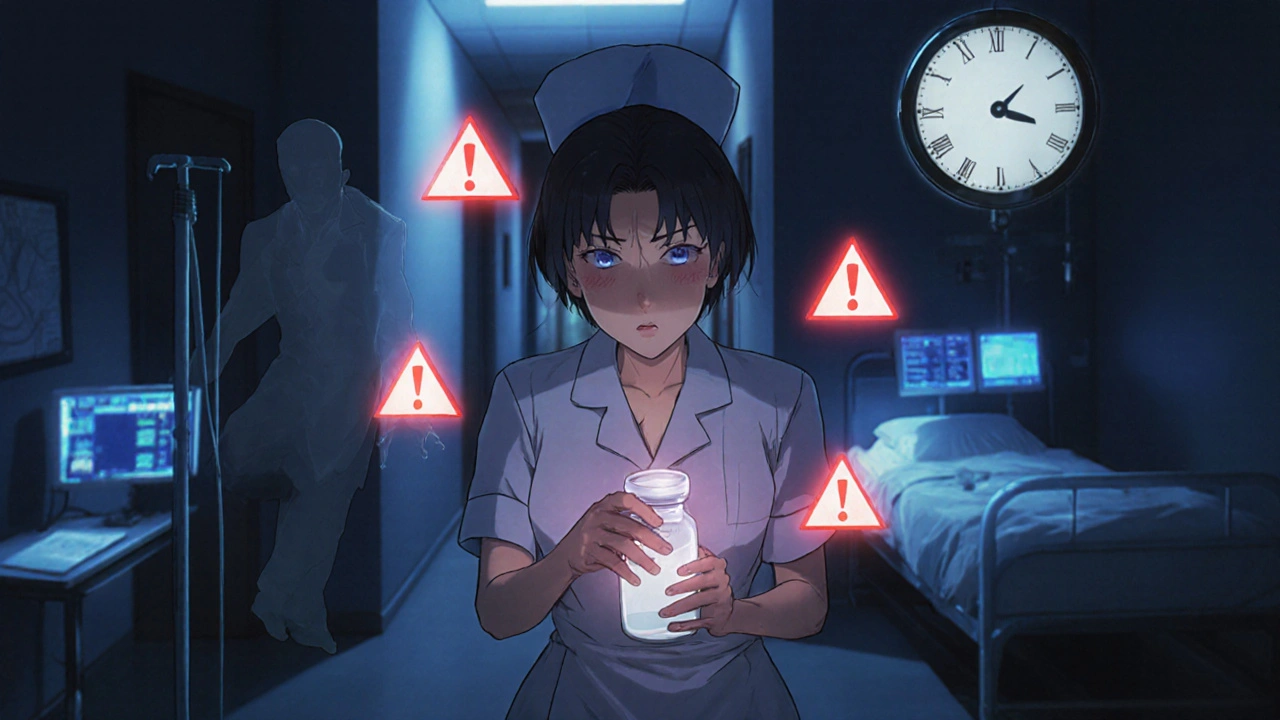


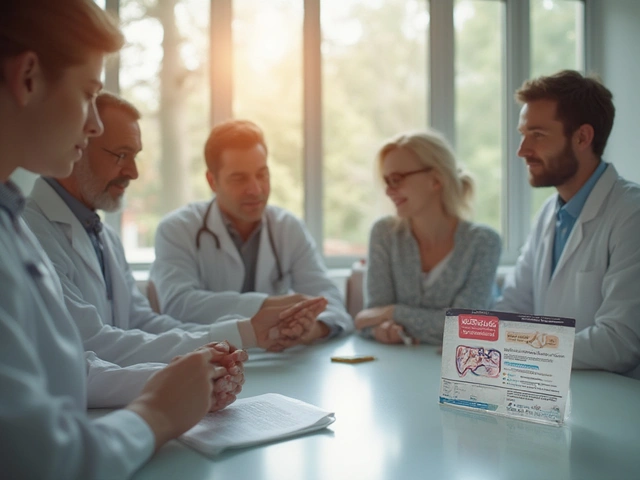
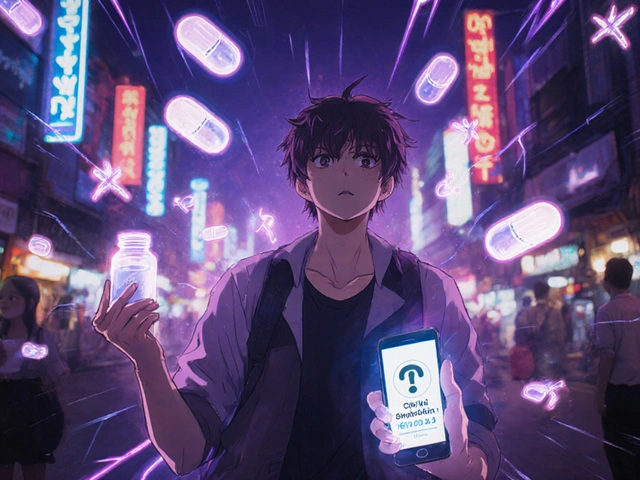
![Ventodep ER (Venlafaxine XR): Uses, Dosage, Side Effects, Interactions [2025 Guide]](/uploads/2025/08/thumbnail-ventodep-er-venlafaxine-xr-uses-dosage-side-effects-interactions-2025-guide.webp)
Gus Fosarolli
28 November, 2025 . 09:26 AM
So let me get this straight-we’re asking nurses to be superhuman while they’re on the clock, then acting shocked when their brains turn to mush? I’ve seen people chug espresso like it’s water and still miss the damn IV line. Fatigue ain’t a personality flaw, it’s a system failure. And yeah, Benadryl at night? That’s like putting a Band-Aid on a hemorrhage.
Evelyn Shaller-Auslander
29 November, 2025 . 10:16 AM
i just started night shifts last month and honestly? i didnt realize how much my sleep aid was making me foggy in the morning. switched to melatonin and wow. still tired but at least i can read the labels now 😅
Ron Prince
30 November, 2025 . 01:36 AM
Why are we coddling healthcare workers? Back in my day we worked 36 hour shifts and didn’t complain. If you can’t handle being awake, get a different job. This whole fatigue thing is just woke culture bleeding into medicine. Also, caffeine is for losers-real men use adrenaline.
Sarah McCabe
1 December, 2025 . 17:58 PM
the nap before shift thing is genius 🙌 i tried it last week and actually felt human during the 4am med pass. also swapped my benadryl for claritin-no more zombie mode. also, pls give us nap rooms. we’re not asking for a spa, just a dark room and a blanket 😭
King Splinter
3 December, 2025 . 16:30 PM
Look, I read the whole thing and honestly? This feels like a 10,000-word cry for help wrapped in a CDC pamphlet. The real issue isn’t caffeine or naps or even meds-it’s that we’ve turned healthcare into a soul-sucking factory where people are treated like disposable cogs. You can’t fix a broken system with checklists. You need to stop pretending that 12-hour shifts are normal. They’re not. They’re a crime against biology. And don’t even get me started on how hospitals make you sign liability waivers while denying you a 20-minute break. I mean, come on. This isn’t medicine. It’s a dystopian sitcom written by a bureaucrat who’s never held a syringe.
Kristy Sanchez
5 December, 2025 . 13:15 PM
Let’s be real-fatigue isn’t the problem. It’s that we’ve normalized suffering as a badge of honor. You think your 18-hour shift makes you noble? Nah. It makes you a statistic. And your ‘strategic nap’? Cute. But it’s just a bandaid on a bullet wound. The real question is: why do we still let people work when their brain is basically a half-dead Wi-Fi router? I’ve seen nurses nod off mid-chart. I’ve seen residents cry in the supply closet. We don’t need more tips-we need to burn the whole system down and start over. And yes, I’m emotionally exhausted just typing this.
Michael Friend
7 December, 2025 . 02:12 AM
Every single one of these ‘solutions’ is just a distraction. The truth is, hospitals are underfunded, understaffed, and run by people who’ve never worked a night shift. The only thing that matters is accountability. If you make a mistake because you’re tired, you should be fired. No excuses. No ‘system failure.’ You’re a professional. Act like it. The rest of this is just performative empathy for people who want to be coddled.
Jerrod Davis
7 December, 2025 . 03:21 AM
It is imperative to acknowledge that the physiological degradation wrought by circadian misalignment constitutes a veritable public health exigency. The empirical literature, as cited, is unequivocal: nocturnal cognitive attenuation is not a matter of personal fortitude but a quantifiable neurocognitive deficit. Consequently, institutional protocols must be restructured to reflect the non-negotiable biological imperatives of human neurophysiology. Failure to do so constitutes a dereliction of duty on the part of healthcare administrators.
Dominic Fuchs
7 December, 2025 . 06:41 AM
They say sleep is for the weak but I reckon it’s the only thing keeping us from becoming the monsters we’re forced to become. You can’t outwill a body that’s been running on fumes for 7 nights straight. The system doesn’t care if you live or die. It just wants the meds delivered on time. So yeah, nap before your shift. Use the checklist. Swap the meds. But don’t pretend any of it fixes the rot. We’re not broken because we’re tired. We’re tired because we’re broken. And no amount of caffeine or claritin changes that